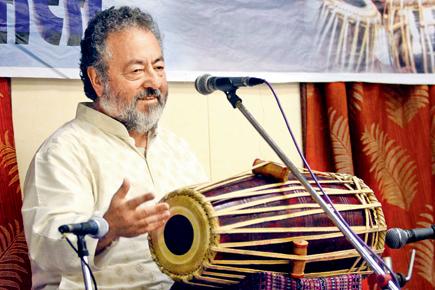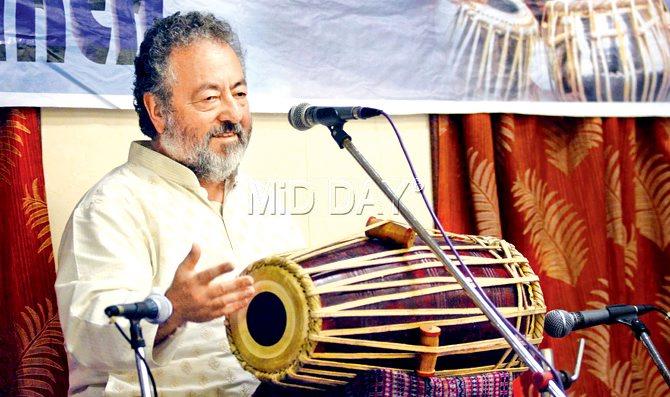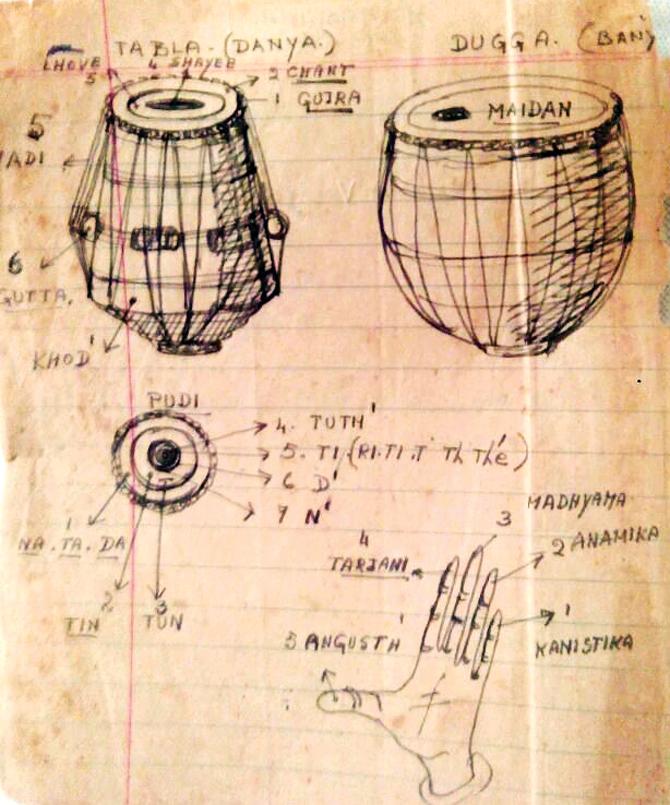This is how the 67-year-old LA-based pakhawaj player, Jeffrey M Feldman describes his friendship with late tabla maestro Pandit Taranath Rao. In Mumbai last weekend for a tribute to his teacher, he speaks of his bond with the pakhawaj, of learning tabla from Ustad Alla Rakha and his new iBook

Jeffrey Feldman plays the pakhawaj as a tribute to his teacher, Pandit Taranath Rao
Though in India after 16 years, Jeffrey M Feldman seems at home, when we meet the kurta-pyjama-clad performer in a suburban hotel. The 67-year-old Los Angeles-based tabla and pakhawaj player was in Mumbai last weekend to perform at a tribute show to his teacher and famous Indian Classical percussion maestro Pandit Taranath Rao (1915-1991) at Tardeo. Having studied under Rao for 12 years in USA, and earlier, with Ustad Alla Rakha and Pandit Harihar Rao, his love for Indian Classical instruments is obvious as he elaborates on taals, khyals, ragas and styles of playing tabla and pakhawaj, despite no knowledge of Hindi. A professor of psychology at LA’s Pierce College, he has co-authored two books — Learning Tabla with Alla Rakha; A Manual of Drumming and Recitation (1983) and The Tabla Legacy of Taranath Rao (2011) — and is now, working on his third. Excerpts from an interview:

Jeffrey Feldman plays the pakhawaj as a tribute to his teacher, Pandit Taranath Rao. Pic/Bipin Kokate
ADVERTISEMENT
Q. How did you get inclined towards learning the tabla and pakhawaj?
A. While pursuing my doctorate in psycholinguistics at the University of Michigan during the 1970s, I heard a recording by a tabla player, Pandit Mahapurush Mishra, at a friend’s house. It was an unusual eight-and-a-half beat taal and once it ended, he said, ‘Indians are the masters of rhythm’. I was so impressed that I decided to learn tabla. I returned to Los Angeles in 1975 and began learning under Pandit Harihar (who was heading Ravi Shankar Music Circle at that time). After a few years, I spent two summers learning with Ustad Alla Rakha and post that, I learnt pakhawaj from Pandit Taranath Rao. I met him on a Christmas day in 1978, and saw him last on Christmas, 1990. With him, it was 12 years of Christmas. He was my guru and my best friend too.
Q. How was the experience of learning with Ustad Alla Rakha?
A. Allaji was amazing. We would be six-seven in class. While playing, he would reach out and fix your finger if the technique was incorrect. He would close his eyes and nod during the sessions and if someone made a mistake, he would tense up and look like he was going to breathe fire. We had difficulty talking one on one, as I don’t speak Hindi but we didn’t have much to talk about except for music.
Q. Why move from tabla to pakhawaj?
A. Through Pandit Harihar, I met Pandit Taranath Rao (his brother), in 1978. He was teaching Indian music at CalArts (California Institute of the Arts). I decided to study with him and after a while, he suggested that I should learn pakhawaj. I was fine with the move as I had learnt tabla from scratch. There were differences — with pakhawaj, you play from side to side, and since you cannot see the hands touching the instrument, you have to rely more on the sound of the beat. I have been playing the instrument for almost 40 years now.
Q. Did not knowing Hindi become a hindrance while playing?
A. I have learnt basic vocabulary but luckily, in most Classical khyals, the meanings of words are not important, they are something to place notes on. So I don’t think I miss out. I can play an accompaniment to any vocal, but I don’t understand the meaning.
Q. Have you performed in India?
A. Yes, I performed a few times at private concerts with guruji (Pandit Taranath Rao). People have been supportive and forgiving too. It’s always exciting and inspiring to play here. I love India, and importantly, its spicy food.
Q. What are you busy with currently?
A. I am working on my third book; it’s based on the teachings of Pandit Harihar Rao. It will be an iBook with computer animations where students can learn how to play the tabla according to the bols and the taals will be written on the screens.
A sound drawing
A graduate from JJ School of Art, Pandit Taranath Rao would introduce a student to tabla by creating a drawing of the tabla and define each of its parts. This illustration was shared by Vinay Balse, one of his students who began learning tabla from him at the age of five.
Who is Pandit Taranath Rao?
Pandit Rao represented Delhi’s Farukhabad gharana of tabla and Nana Panse tradition of pakhawaj. The Mangalore-born maestro (1915-1991) performed and taught Indian Classical percussion. He learnt from Ustad Shamshuddin Khan and Subbarao Ankolekar. While he has performed with his contemporaries like Pandit Ravi Shankar and Pannalal Ghosh, he was a faculty member of CalArts for 12 years, and taught students in Mumbai. “He never performed with us as he didn’t want us to copy him and instead develop our style,” says 69-year-old Pandit Sadanand Naimpalli, his senior-most disciple.
 Subscribe today by clicking the link and stay updated with the latest news!" Click here!
Subscribe today by clicking the link and stay updated with the latest news!" Click here!







